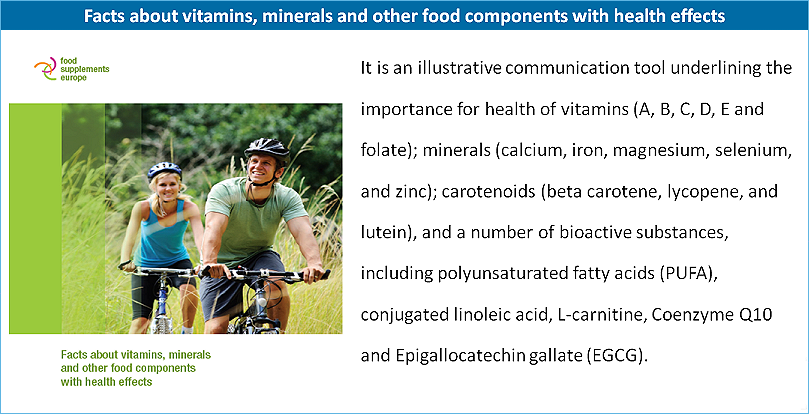Vitamins are natural components of foods that are essential in very small amounts for supporting normal physiologic function. It is recognized that vitamin deficiencies can create or intensify chronic health conditions. They have an essential role for body physiologic functions such as growth, reproduction, etc. Vitamins and their derivatives often serve a variety of roles in the body and one of the most important is their function as cofactors for enzymes, e.g. coenzymes NAD and FAD require vitamins B3 and B2, and red blood cell synthesis demands vitamin B9, B6, B12, but also for energy releasing processes Vitamin B1, B2, B3, B5, B6, biotin are necessary. Water soluble vitamins (more 2.1.1) are absorbed by both passive and active mechanisms, based on specific molecular carriers, are not stored in big quantities in the body and are excreted in the urine with their metabolites. There is a constant need for their regular intake via food. Fat soluble vitamins (more 2.1.2) are mostly absorbed passively and must be transported with dietary fat. These vitamins are usually found in the portion of the cell which contains fat, including membranes, lipid droplets, etc.
Most minerals are considered essential and comprise a vast set of micronutrients. There are both macrominerals (more 2.1.3) (required in amounts of 100 mg/day or more) and microminerals (more 2.1.4) (required in amounts less than 15 mg/day). Vitamins and minerals keep a "k" role in normalizing physical functions and an adequate intake from food and/or supplements is necessary to prevent deficiency, promote optimal health, improve nutrient partitioning and promote fat loss and muscle gain.
Some other important bioactive food components are polyphenols, anthocyanidins, carotenoids, flavonoids, glucosinolates, isoflavonoids, limonoids, lycopenes, omega-3 and 6 fatty acids, phytoestrogens, phytosterols, polyphenols, probiotics, resveratrol and terpenoids. They play specific pharmacological effects in human health as anti-inflammatory, anti-allergic, antioxidants, antibacterial, antifungal,antispasmodic, chemopreventive, hepato-protective, hypolipidemic, neuroprotective, hypotensive, anti-ageing, antidiabetic, osteoporosis, protection of DNA damage, cancer and heart diseases, induce apoptosis, diuretic, CNS stimulant, analgesic, protects from UVB-induced carcinogenesis, immuno-modulator and carminative.
The European Responsible Nutrition Alliance (ERNA) has published an information book on the scientific facts relating to the safety and health benefits of vitamins, minerals, and other food components in Oct 10, 2011. The fact book, which can also be downloaded from the ERNA website, was developed to provide an overview of information available in scientific literature, and it is presented in the next Table 2.1.1.

In addition, manufacturers of nutritional supplements need a broad knowledge of the bio-availability of the active ingredients and their effects to be able to make high-quality products. There are major variations in the body's uptake and the effect of the active ingredients depending on the form in which they are supplied. The regulations on nutritional supplements have appendices that are intended to ensure that the chemical compounds used as a source of vitamins and minerals are safe and present in a form that the body can absorb.






